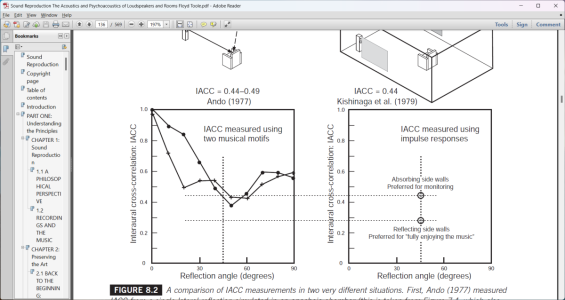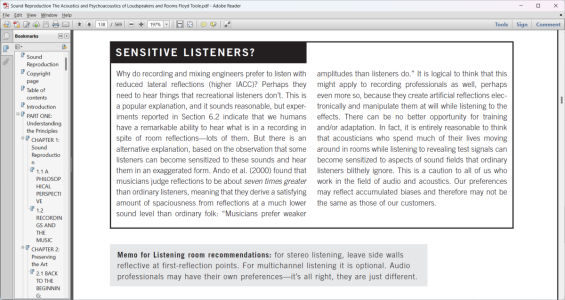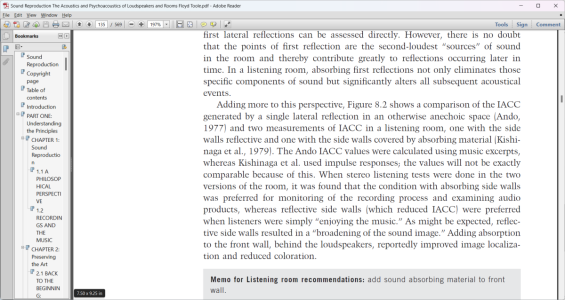That does not make it conclusive unless you have also considered others perspective as well. If you wish to listen and judge the other perspective as well then you should consider listening them as well - imo.At least my comments are coming for personal experience for many years, mostly from WIP listening rooms in exploration stages at friend's homes and once at my home as well.
You are using an out of date browser. It may not display this or other websites correctly.
You should upgrade or use an alternative browser.
You should upgrade or use an alternative browser.
Why there is little focus on acoustics
- Thread starter matbhuvi
- Start date
square_wave
Well-Known Member
"Exploration stages" in my previous post meant that I have considered and listened "with" and "without" varying degrees of acoustic treatment in various rooms and have acquired some wisdom in that area as it applies to my taste and preferences. Did you mean something else when you said "other perspective"?That does not make it conclusive unless you have also considered others perspective as well. If you wish to listen and judge the other perspective as well then you should consider listening them as well - imo.
I also admit that some audiophiles experiment and completely dislike any form of acoustic treatment in their rooms. I totally respect that perspective as well.
@square_wave Have you listened a completely dead room and a completely live room?
I am not against any room treatment. But saying that room treatment is the only way to achieve sonic bliss - which I disagree.
As per my previous post, doing a diagonal room placement for speakers and listening position (like mine) you can completely avoid the first reflection reaching your ears. Also the speakers are facing both the front and rear wall in an angle, so any standing waves in mid and high frequency is reduced. Reflections if used Judicously helps in spatial resolution and spaciousness. Managing the late rare reflections by careful placement of objects in the room helps in even dispersion of HF giving concert hall like expansive open sound. All these can be done without any purchase of any absorbant or diffuse materials. It just requires a proper review and approach to room treatment and not blindly following what others are doing.
If you wish to discover more, then PM me.
I am not against any room treatment. But saying that room treatment is the only way to achieve sonic bliss - which I disagree.
As per my previous post, doing a diagonal room placement for speakers and listening position (like mine) you can completely avoid the first reflection reaching your ears. Also the speakers are facing both the front and rear wall in an angle, so any standing waves in mid and high frequency is reduced. Reflections if used Judicously helps in spatial resolution and spaciousness. Managing the late rare reflections by careful placement of objects in the room helps in even dispersion of HF giving concert hall like expansive open sound. All these can be done without any purchase of any absorbant or diffuse materials. It just requires a proper review and approach to room treatment and not blindly following what others are doing.
If you wish to discover more, then PM me.
square_wave
Well-Known Member
It is all science and totally agree with you that with experiments like diagonal placement and also judicious use of reflections helps with tweaking sound to one's preferences.Have you listened a completely dead room and a completely live room?
I am not against any room treatment. But saying that room treatment is the only way to achieve sonic bliss - which I disagree.
As per my previous post, doing a diagonal room placement for speakers and listening position (like mine) you can completely avoid the first reflection reaching your ears. Also the speakers are facing both the front and rear wall in an angle, so any standing waves in mid and high frequency is reduced. Reflections if used Judicously helps in spatial resolution and spaciousness. Managing the late rare reflections by careful placement of objects in the room helps in even dispersion of HF giving concert hall like expansive open sound. All these can be done without any purchase of any absorbant or diffuse materials. It just requires a proper review and approach to room treatment and not blindly following what others are doing.
If you wish to discover more, then PM me.
My views were all in the context of typical rectangular rooms where there is a side wall present in near vicinity and the usual way of placement of speakers firing into the room.
Placement science solves a lot of problems. The best way to approach acoustics treatment (if any) is to get your placement right as the first step. In some of my experiments, we had arrived at the best possible placement in the room possible. Once we achieved that, we tried various forms of judicious and careful placement of various types of panels on the wall. I preferred a certain type of panels on the wall in such a room / speaker configuration. It gave me the best balance of image focus and ability to hear into the soundstage with directional cues intact. Removal smeared all of it to a certain extent. I am sure a diagonal placement might yield a different result.
I really hate the sound when "excessive" first and second reflections reflect on blank hard surface side walls and reach my ears in a conventional room. Apart from the smearing, it affects the tonality of the speaker as well.
Looks like you have a different way of solving the issue. so, I admit we don't have a diverse opinion about the result after all.
Last edited:
According to Floyd Toole you need not absorb or diffuse the first reflection in a small room as the sound will anyway take the precedence effect and the reflected sound will not be heard as a secondary source if the delayed sound is <30msec. Infact having a moderate to strong first reflection helps in spatial resolution and liveliness in sound.
Early reflection if heavily absorbed can sound muddy in speech and it will be difficult to understand the lyrics properly.
I always preferred absorption in first reflection point. To me reflection caused muddy sound as the same sound cues reach you in different times.
You will get a wider sweetspot from the speaker if you let the reflections untamed.
I am not sure how large your soundstage is and how far the side walls are from the speakers and where your listening position in the room is. If you are saying that if reflections are arriving at in different times, then to me it sounds like a very large room and reverberation. Infact to get a wider sweet spot you will need more reflection for spatial resolution and envelopement by the sound and not the opposite. Most standard small rooms the delay due to reflection is 30msec and for a very large room it can be around 80msec.I always preferred absorption in first reflection point. To me reflection caused muddy sound as the same sound cues reach you in different times.
You will get a wider sweetspot from the speaker if you let the reflections untamed.
Last edited:
square_wave
Well-Known Member
Thank you for continuing to share these notes. Quite insightful. In the past, I've spent considerable time on several of these studies and have also witnessed many debates among seasoned audiophiles on various forums. Ultimately, it all comes down to personal preferences. These papers don't present a universal truth that can be blindly applied to everyone. People have different sensitivities when it comes to sound in their personal space. Over the years, experienced audiophiles, after experimenting with many options, settle on a wide range of solutions that they prefer. There's no one-size-fits-all solution.
Let sleeping dogs lie.
Let sleeping dogs lie.
In my observation, I noticed that after a while, a thread enters a saturation point. Beyond which there is nothing new and the discussion goes in circles.
This comes down to personal preferences and this is entirely subjective. There are different ways to achieve good sound with careful orchestration of speaker’s position and the room’s contents.
If the thread could be focused on insights on room treatment gained from personal experience, it would be awesome.
This comes down to personal preferences and this is entirely subjective. There are different ways to achieve good sound with careful orchestration of speaker’s position and the room’s contents.
If the thread could be focused on insights on room treatment gained from personal experience, it would be awesome.
Last edited:
My experience on room placement,In my observation, I noticed that after a while, a thread enters a saturation point. Beyond which there is nothing new and the discussion goes in circles.
This comes down to personal preferences and this is entirely subjective. There are different ways to achieve good sound with careful orchestration of speaker’s position and the room’s contents.
If the thread could be focused on insights on room treatment gained from personal experience, it would be awesome.
1. If your speakers are parallel to the rear and front wall then you will need to put absorbers on the front and rear wall to reduce strong standing waves and room modes.
2. You need not put any absorbent on the first, second and third reflection point on the side walls as there are no standing waves at the sweet spot as these reflections are in an angle and need not be absorbed. Infact absorption of these side reflection will reduce spatial resolution and spaciousness.
3. If you can place your speakers diagonally towards your seating position, then treating the front and the rare wall is also not required as there will not be any standing waves anywhere in the room as the walls are now at an angle to the speakers. Moreover based on your placement and the room dimensions you won't hear any side reflections either as they sre also in an angle.
4.Diagonal room placement gives the opportunity for spaciousness, liveliness without any major side reflection or standing waves. Also depending upon how far the left and right speakers are placed you get a deep and wide sound stage, separation and imaging.
It's said that - only listening is believing in audio and this is very true in this case. You can keep on arguing on the merits and demerits of diagonal speaker placement in a rectangular room, but you won't progress a mm/ inch unless you try this yourself. Period.
Passive_audio_enthusiast
Well-Known Member
"If you absorb the first reflection you will loose and NOT gain direction cues” - once again - how will you loose it? It’s mentioned that it’s not required that you need to absorb the reflections..but it also doesn’t say that if you absorb it, it will absorb the directional cues. !You did not read the concusion on the last image - which I asked you to read
"In conclusion, it seems that the basic audible effects of early reflections in recordings are well preserved in the reflective sound fields of ordinary rooms. There is no requirement to absorb first reflections to allow recorded reflections to be heard."
I give up by the way
Do you hear the difference when you remove your glasses when listeningto music? I do
Do you feel the difference when you lean forward from your couch which grows beyond your shoulder? I do
If you don't. You are lucky and I just envy you.
Do you feel the difference when you lean forward from your couch which grows beyond your shoulder? I do
If you don't. You are lucky and I just envy you.
There is no universal evidence to substantiate that opinion. May be the perception of reality is subjective to every individual. We also need to spell out what exactly is different. It surely would sound different in terms of clarity but it wouldn’t vary from synthetic to natural because of different room acoustics. One would still recognise spouse’s voice from another room regardless. And we would know whether it is reproduced or live.
You hit the nail on it's head. The bigger elephant in the room is not the room acoustic, but the individual brain. It differs from people to people and it gets highly influenced in matters of self healing, taste and sound. Price the wine attrociously, it will taste good. Same With cables, amps and dacs where many people go bat shit crazy based on the urband legends associated with the media format, cable, amp, dac and even enjoy devices that naturally distort. You can't question what people hear because few religions have been founded by founders based on what they heard. Questioning that would be blasphemy not akin to the "Emperor's new cloth". Take a poll on what people here think about ASR.There is no universal evidence to substantiate that opinion. May be the perception of reality is subjective to every individual. We also need to spell out what exactly is different. It surely would sound different in terms of clarity but it wouldn’t vary from synthetic to natural because of different room acoustics. One would still recognise spouse’s voice from another room regardless. And we would know whether it is reproduced or live.
sivakumars
Member
I'm not able to comprehend the feeling of this as I started treating room before started buying any of the hifi gears.. There was even a comment in my first thread advising me to get some gears before I do any more room treatment 
Yeah, I enjoy my low cost setup(yeah, very basic compared to the gears owned by forum members) a lot and it is pretty good actually.. i think it is due to the room treatment..
Yeah, I enjoy my low cost setup(yeah, very basic compared to the gears owned by forum members) a lot and it is pretty good actually.. i think it is due to the room treatment..
Wharfedale Linton Heritage Speakers in Walnut finish at a Special Offer Price. BUY now before the price increase.
Similar threads
- Replies
- 9
- Views
- 2K




